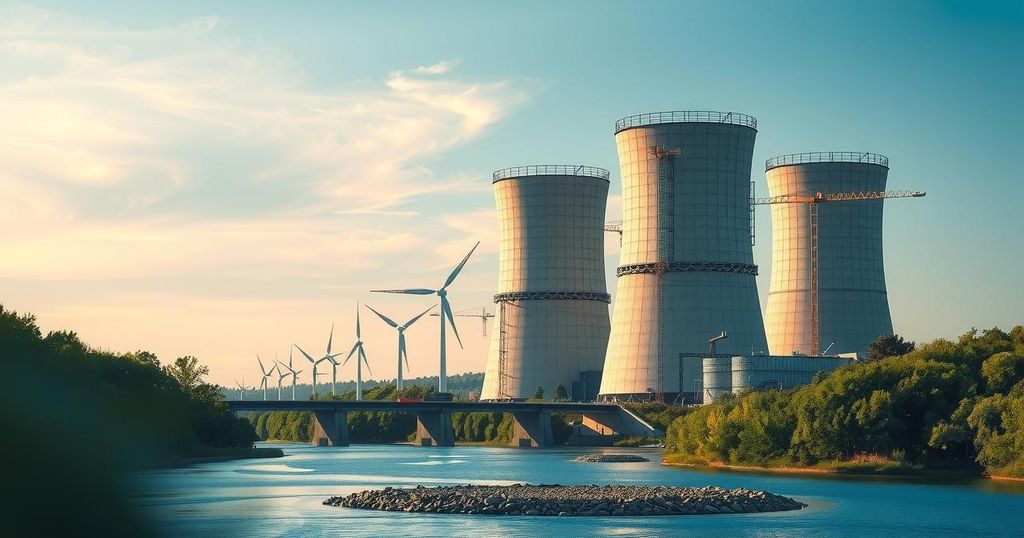Brazil’s CNPE has delayed the Angra 3 nuclear project decision, citing the need for Eletronuclear’s governance improvements. Construction began in 1984, halted multiple times, and is now 65% complete. Costs to complete versus abandon highlight strategic energy implications for Brazil. Recent governance agreements affect future project financing and operational capabilities.
Brazil’s National Energy Policy Council (CNPE) has decided to delay further actions regarding the construction of Angra 3, a nuclear power unit at the Angra Nuclear Power Plant (NPP). The existing facility already houses two operational pressurized water reactors (PWRs)—Angra 1, which has been operational since 1985 and has a capacity of 640 MWe, and Angra 2, operational since 2001 with a capacity of 1,350 MWe. Angra 3, which employs a Siemens/KWU reactor design, began construction in 1984 but was halted in 1986 after two years. The project resumed in 2006, with significant progress made, but work was suspended again in 2015 due to corruption allegations, leaving the unit approximately 65% complete by that time.
In 2022, Eletronuclear, the subsidiary of Eletrobras responsible for nuclear energy, requested to restart the construction. However, in April 2023, the local government of Angra dos Reis intervened, ceasing work due to various compliance issues, including compensation payments. Eletronuclear undertook several strategic initiatives in February 2023 to enhance company management and financial sustainability, aimed at facilitating the continuation of Angra 3’s construction.
During a recent CNPE meeting, Minister of Mines & Energy Alexandre Silveira emphasized the critical nature of the nuclear sector for Brazil’s energy future, while also stressing the necessity of a comprehensive review of Angra 3’s status. Silveira expressed support for completing Angra 3, contingent on Eletronuclear’s restructuring efforts, stating, “Today it is not a company that we are sure can execute a work of this size.”
In 2019, Eletronuclear commissioned the National Bank for Economic & Social Development (BNDES) to assess the technical, economic, and legal feasibility of the Angra 3 project, completing a study in September 2024. The findings indicated that abandoning the project could incur costs exceeding BRL21 billion, while finalizing construction would cost approximately BRL23 billion, with nearly BRL12 billion already invested. Angra 3’s anticipated commercial operation date is now set for 2031.
Industry experts advocate for the resumption of the Angra 3 project as a crucial step in securing Brazil’s energy stability, particularly as reliance on intermittent renewable sources grows. However, Eletronuclear enters 2025 encumbered by significant debt of BRL7 billion and an operational cost estimated at BRL800 million annually. The situation is further complicated by Eletrobras’s status as a privatized entity, holding a 35% voting share of Eletronuclear.
Silveira warned that failing to proceed with Angra 3’s completion could result in an immediate cost of BRL14 billion, including supplier contract terminations and project demobilization costs. Additionally, this could jeopardize the operational capacity of Angra 1 and Angra 2, as Eletronuclear would lack the funds for necessary fuel purchases. ENBPar, the state-owned entity overseeing nuclear energy, would face substantial accounting costs tied to plant asset devaluation.
In light of the CNPE discussions, Eletrobras engaged with the Federal Government to reach a conciliation agreement regarding governance roles post-privatization. Discussions led to an agreement addressing essential governance aspects in Eletrobras, paving the way for resolving a pending lawsuit in Brazil’s Federal Supreme Court involving the company’s future and the Angra 3 project.
The management arrangement agreed upon includes increasing the number of government-appointed members on Eletrobras’ Board of Directors, enhancing oversight and governance. Guarantees previously allocated by Eletrobras for the Angra 3 financing will remain intact until a decision is made to resume construction. Nonetheless, the investment agreement concerning the financing of Angra 3 will be suspended until the relevant authorities approve resumption plans.
BNDES has been called upon to explore fresh options for the Angra 3 project’s completion. Additionally, Eletronuclear plans to issue BRL2.4 billion in debentures to fund the life extension of Angra 1, with provisions for converting these bonds into shares, contingent upon operational cost reductions, and stipulations concerning the Angra 3 project’s completion model.
Brazil’s CNPE has postponed decisions on the Angra 3 nuclear project, highlighting the need for Eletronuclear’s effective governance and restructuring before proceeding. The projected costs of completion and abandonment emphasize the importance of maintaining strategic energy sources in the face of growing renewable energy demand. Conciliation agreements and studies will shape the future of Angra 3, which remains an essential focus for Brazil’s energy sector.
Original Source: www.neimagazine.com






